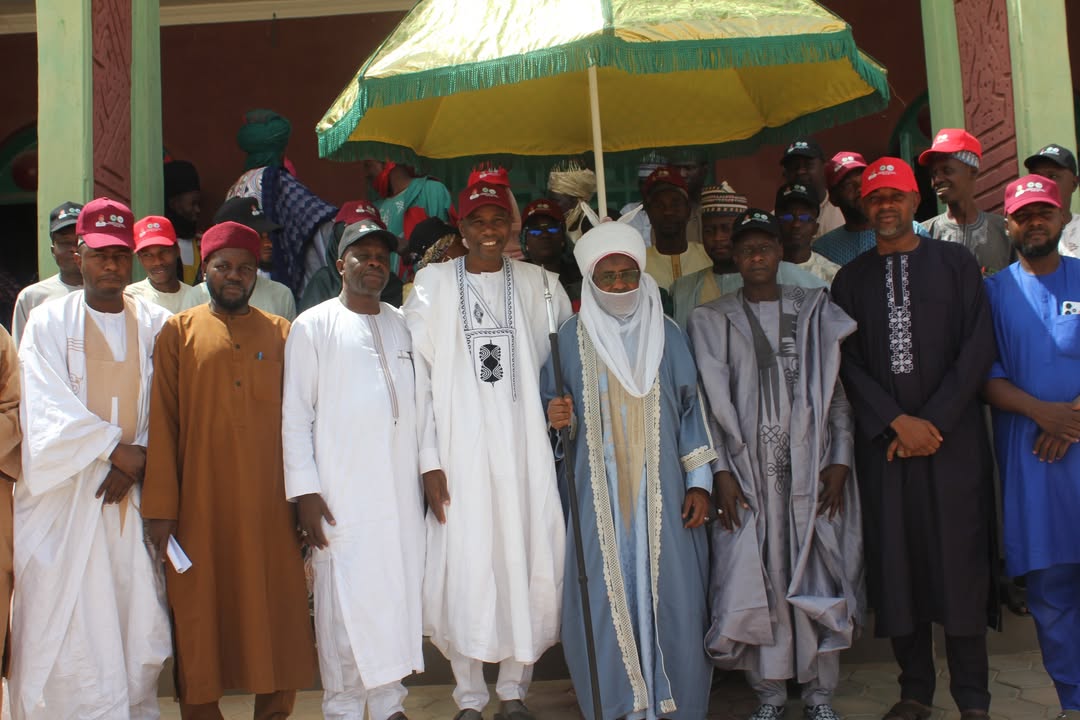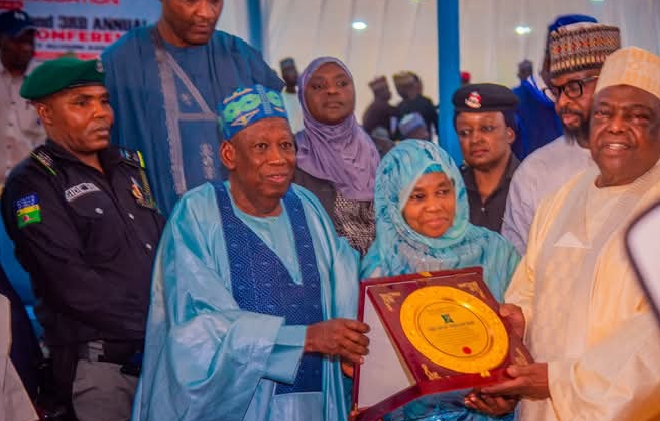News
5G, 6G and 7G: Why Nigerian Telecom Industry Must Not Be Reactive – Maida

Nasiru Yusuf Ibrahim
Nigeria’s chief telecommunications regulator, Dr. Aminu Maida, has again harped that the industry should move beyond mere compliance and reactive measures, and instead, harness the power of new generation technologies and trends to build a resilient and future-proof industry.
KANO FOCUS reports that Dr. Maida, the executive vice chairman of the Nigerian Communications Commission (NCC), made the remark at the Telecoms Industry Risk Management Conference held in Lagos, recently.
Speaking on the conference theme: ‘Evolution and Future Risk Management in the Telecoms Industry: Harnessing Emerging Technologies and Trends’, the EVC said that in an era marked by rapid technological advancements, the telecommunications industry finds itself at the forefront of innovation, shaping the way people communicate, connect, and conduct business.

“As we navigate this dynamic environment, the need for effective risk management becomes increasingly paramount. Today, we stand at the crossroads of tradition and transformation, where emerging technologies and trends present both unprecedented opportunities and challenges.
“While we discuss the current landscape of 5G networks, which boast of wider attack surface due to the increased number of connected devices and denser network infrastructure, it is imperative to even cast our gaze into the future.
“We are witnessing the dawn of 6G technology, the next frontier in wireless communication. With promises of even faster speeds, lower latency, and groundbreaking applications, 6G has the potential to revolutionize the way we experience connectivity.
According to Statista:The 6G user-experienced data rate is expected to reach 1,000 Mbps, ten times faster than the user-experienced data rate of 5G.
While higher-band spectrum brings faster speeds it also poses problems that need to be solved, including difficulties in penetrating walls and water.
However, with this advancement comes the responsibility to address new risks, from cybersecurity threats to ethical considerations, ensuring that we pave the way for a secure and inclusive digital future.
To this end, the EVC said “As we contemplate the possibilities, we must acknowledge that with each generational leap, we face not only technological advancements but also a fresh set of challenges.
“Anticipating and managing risks associated with 7G will require collaboration, innovation, and a proactive approach to ensure the seamless integration of this technology into our interconnected world.
“In addition to the evolution of connectivity, we must consider the implications of emerging technologies such as quantum technologies (computing, sensing, and communications), advanced artificial intelligence, and Block Chain (distributed ledger) technologies. These trends, when harnessed effectively, hold the potential to transform our industry positively. However, they also introduce complexities that demand careful consideration in our risk management strategies.
The Nigerian Communications Commission (NCC) remains committed to fostering an environment that encourages innovation while prioritising the security and stability of our telecom infrastructure. As we navigate through 5G and the uncharted territory of the next generations of wireless technologies, collaborative efforts among regulators, industry players, and other stakeholders become even more crucial for sharing best practices, threat intelligence, resources and implementing robust risk management strategies.
“We should therefore move beyond mere compliance and reactive measures, and instead, harness the power of these new technologies and trends to build a resilient and future-proof industry.

Headlines
Kano AGILE renovates 1,300 schools, enrolls 30,000 girls in three years

Aminu Abdullahi Ibrahim
The Kano State Ministry of Education’s Adolescent Girls Initiative for Learning and Empowerment (AGILE) Project, supported by the World Bank, has successfully renovated over 1,300 senior and junior secondary schools in the state in the last three years.
KANO FOCUS reports that the state commissioner for education, Alhaji Ali Haruna Makoda, disclosed this during a visit to the Karaye Emirate on Tuesday.

He added that the AGILE program has enrolled more than 30,000 girls through targeted outreach, grants, and its Second Chance education initiative.
Makoda further revealed that the state government has finalized plan to construct 130 new schools in rural communities, with over 35,000 girls already benefiting from financial assistance under the scheme.
He urged the Karaye Emirate to lend full support to the program and prioritize girls’ education.
In his remarks, the Emir of Karaye, Alhaji Muhammad Maharaz, pledged the emirate’s commitment to advancing girls’ education in Kano State.
He commended the state government and the commissioner for their dedication to the programme’s success.
“It is our collective responsibility to support this initiative,” the Emir stated, calling for measures to ensure beneficiaries complete their education with strong academic outcomes.
The commissioner’s delegation consist of the Kano State AGILE Project Coordinator, Malam Mujitapha Aminu and other members of State Programme Implementation Unit (SPIU).

Headlines
BUK Faculty of Education celebrates 50 years anniversary, launches Alumni Association

Aminu Abdullahi Ibrahim
Bayero University Kano (BUK) on Monday celebrated the 50th anniversary of its Faculty of Education and inaugurated its Alumni Association at the Convocation Arena of the university’s new campus.

KANO FOCUS reports that the event was graced by government officials, education stakeholders, and alumni all gathered to commemorate the faculty’s contributions to Nigeria’s educational sector.
In her keynote address, the State Minister for Education, Mrs. Suwaiba Sa’id Ahmad announced the Federal Government’s Sector Renewal Initiative designed to transition Nigeria from a resource-based to a knowledge-based economy.
She highlighted that the aim of the renewal initiative consists of – Reducing the number of out-of-school children; combating learning poverty; nhancing skills development and human capital for the labor market
The minister noted that the initiative prioritizes Technical and Vocational Education and Training (TVET); Science, Technology, Engineering, and Mathematics (STEM); Digital literacy and education quality assurance.
Mrs. Ahmad disclosed that the Federal Government had disbursed ₦35 billion to 261 beneficiaries under the Nigerian Education Loan Fund (NELFUND), with BUK among the top beneficiaries.
“So far, the scheme has received 420 applications, and we are scaling up investments,” she stated.
She further confirmed that President Bola Ahmed Tinubu approved ₦120 billion to boost TVET programs, with plans to train 650 youths in technical, vocational, and digital skills over the next two years.
Emeritus Professor Sani Ahmad Sufi, former Permanent Secretary of the Ministry of Education, praised the faculty for its high-quality graduates.
“Our pride lies not just in the number of graduates produced yearly, but in their impact across Nigeria and beyond,” he said.
He added that the faculty has produced Nigeria’s largest pool of graduate teachers many of whom hold key positions nationally and internationally.
The National Chairman of the All Progressives Congress (APC), Dr. Abdullahi Umar Ganduje applauded the faculty for its significant role in advancing education in Nigeria.
The event concluded with awards presented to distinguished alumni and supporters of the faculty in recognition of their contributions to its growth.

Headlines
Governor Yusuf Champions Education, Resolves Certificate Crisis for Kano Graduates

Kano State Governor Abba Kabir Yusuf has emerged as a beacon of hope for graduates left stranded due to the previous administration’s negligence regarding academic certificates.
His determination to rectify these injustices has culminated in decisive actions to secure the future of Kano’s youth. Ibrahim Adam, the Special Adviser to the Governor on Information, shared these developments with the media.
On December 9, 2024, Governor Yusuf traveled to Cyprus with a mission to obtain the overdue academic certificates for Kano students affected by the prior administration’s failure to meet its educational financial obligations.
During a critical meeting with the management of Near East University, the governor focused on facilitating the release of certificates for students who graduated between 2015 and 2019, particularly in essential fields like Medicine and Nursing.
This was confirmed by Sunusi Bature Dawakin Tofa, the governor’s spokesperson.

In a significant move, Governor Yusuf has settled the outstanding fees of €1.4 million (approximately ₦2.5 billion) owed to the university for 84 medical and2015 to 2019.
This substantial financial commitment honors the dedication and hard work of these graduates, restoring their hopes for a future that had previously been unjustly delayed.
According to Ibrahim Adam, the certificates are set to be handed over to the Kano State Scholarship Board through the Nigerian Ambassador to Turkey, marking a pivotal moment for the affected students.
Governor Yusuf acknowledged the challenges faced by the graduates, declaring, “This situation has been a significant setback for our children, hindering their dreams and aspirations, and it has also affected our state, which is in dire need of their expertise.”
His vision for a prosperous Kano is centered on prioritizing education, ensuring that talented individuals can make valuable contributions to the state’s advancement.
The governor’s proactive measures not only address the systemic issues in the education sector but also inspire renewed hope among Kano’s youth.
By fulfilling his promises, he emphasizes the crucial role of supporting young people in achieving their aspirations, which is vital to the state’s growth.
As this milestone is celebrated, it is evident that Governor Abba Kabir Yusuf’s relentless pursuit of educational reform signals a transformative era for Kano State.
His administration’s unwavering focus on education stands as a vital investment in the futures of individuals and the overall development of the state.
Under his leadership, Kano State is poised to realize its full potential, with eager graduates ready to make impactful contributions to their communities.
Governor Yusuf’s commitment to empowering the youth serves as an enduring reminder that with dedication and decisive action, a brighter future is attainable for all.














